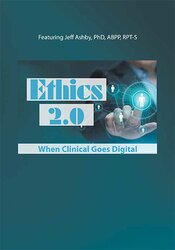

Digital Technology Has Changed the Way We Serve and Interact with Clients
Let’s face it—the digital age is here to stay, and it has ushered in a complete paradigm shift in what it means to provide quality, ethical mental health treatment. Your current clients, and potential new ones, are accustomed to being able to receive every imaginable service using technology as the format. It only stands to reason that they are seeking, and even expecting, the type of services you provide to be available in the same fashion. Whether you are already in the digital space, or you realize that you want and even need to be, the ethical considerations are unique, complex, and exciting all at the same time.
In this recording, let Jeff Ashby, PhD, ABPP, RPT-S – a mental health clinician with 20 years of clinical and research experience – be your guide as you explore the ethical issues related to social media, blogs, websites, and more. Through discussion, case examples, and experiential exercises, learn how to address complex ethical dilemmas while maintaining the highest standards of clinical practice.
| File type | File name | Number of pages | |
|---|---|---|---|
| Manual - Ethics 2.0 (1.61 MB) | 60 Pages | Available after Purchase | |
| Manual - Ethics 2.0 - French (1.61 MB) | 60 Pages | Available after Purchase | |
| Module 1-3: Manual - Ethics 2.0 - French (1.61 MB) | 60 Pages | Available after Purchase | |
| Manual - Ethics 2.0 - Italian (1.61 MB) | 60 Pages | Available after Purchase | |
| Module 1-3: Manual - Ethics 2.0 - Italian (1.61 MB) | 60 Pages | Available after Purchase |

Jeff Ashby, PhD, ABPP, RPT-S, is a professor in the department of counseling and psychological services at Georgia State University. He is the director of Georgia State’s Counseling Psychology doctoral program, a licensed psychologist, and a Diplomate of the American Board of Professional Psychology. Dr. Ashby has taught ethics at the graduate level for over 20 years and has served as the chair of the Ethics Committee of the International Association of Play Therapy and as an ethics content expert with the State of Georgia Psychology board. He has made over 100 presentations at professional conferences and authored/co-authored more than 80 articles in refereed journals, numerous book chapters, and two books.
Dr. Ashby received a BA in psychology and english literature from the University of Kansas, an MEd in counseling and school psychology from Wichita State University, and a PhD in counseling psychology from Penn State.
Speaker Disclosures:
Please wait ...